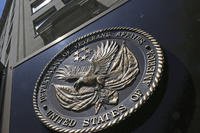Real estate magnate and celebrity billionaire Donald Trump has vowed to bring back waterboarding if he becomes president.
But that's an order he would find much harder to implement than it was 15 years ago, when President George W. Bush allowed the Central Intelligence Agency to use torture technique after the 9/11 attacks.
"If some future president is going to decide to waterboard, he'd better bring his own bucket -- because he's going to have to do it himself," former CIA Director Michael Hayden says in Spymasters: CIA in the Crosshairs, a Showtime documentary that airs Nov. 28.
Trump, who holds the lead in the race for the Republican Party nomination, said last week he would "bring it back."
"I think waterboarding is peanuts compared to what they'd do to us, what they're doing to us, what they did to James Foley when they chopped off his head," he said on ABC's This Week. "That's a whole different level, and I would absolutely bring back interrogation and strong interrogation."
While some former Bush officials continue to claim that waterboarding provided actionable intelligence, numerous intelligence officials and operatives say otherwise, as did a bipartisan task force formed to look into the abuses.
The Task Force on Detainee Treatment, sponsored by The Constitution Project, a legal research and advocacy group in Washington, D.C., was co-chaired by former Bush Homeland Security Department Secretary Asa Hutchinson and former Rep. James Jones, D- Oklahoma.
The task force concluded the interrogation techniques used on detainees constituted torture in violation of U.S. law and international treaties and were without justification.
The group also concluded there was no firm or persuasive evidence that the use of harsh interrogation techniques produced significant information of value, but there "is substantial evidence that much of the information adduced from the use of such techniques was not useful or reliable."
The task force also rejected the claim made by former Attorney General Michael Mukasey in an op-ed entitled "The Waterboarding Trail to Bin Laden" that Khalid Sheik Mohammed gave intel needed to find and kill the al-Qaida leader while being waterboarded.
George Tenet, CIA director at the time of 9/11 and until 2004, suggests in Spymasters that he gave little thought at the time to the efficacy or morality of waterboarding or any other interrogation abuses.
"We didn't have time to become their best friends," he tells them. "I still look at the ceiling at night about a lot of things, and I'll keep them to myself forever."
Those who went into the job after the worst of the abuses had ended are more open, with John Brennan -- Tenet's deputy director for a time -- saying there were a number of interrogation techniques he felt were "inappropriate, not necessary and beyond the pale" and would "come back to haunt us."
Brennan said he would tell any president who wanted to bring back waterboarding that he is "sorry, I do not believe that is in our best interest as a country."
Former CIA Director David Petraeus, a former commander of U.S. Central Command and of the multi-national force in Afghanistan, also rejected torture as a means of gaining valuable information from prisoners.
"We visit violence on our enemies, but we should not mistreat them, even though they have done unspeakable things to our soldiers and to civilians. That does not justify us doing it to them," Petraeus says in the documentary. "You will pay a price for what you do, and it will be vastly greater than whatever it is you got out of taking this action."
Not all the former CIA directors' stated misgivings about waterboarding or other abuses stems from not believing in them, however. In the case of Hayden, it appears to be more about the political or public relations consequences.
Even as he disputed Mukasey's contention that Mohammed gave up critical intel on how to find bin Laden, Hayden said that "it is nearly impossible to imagine" how bin Laden could have been captured or killed without intelligence gained from the CIA program, the Task Force quotes him as saying.
Separately, a group of 15 former CIA, FBI and military intelligence officials signed a statement in 2008 damning the abusive interrogation programs as "morally reprehensible and ineffective to boot."
"Torture and other inhumane and abusive interview techniques are unlawful, ineffective and counterproductive. We reject them unconditionally," the group agreed.
-- Bryant Jordan can be reached at bryant.jordan@military.com. Follow him on Twitter at @bryantjordan.





























